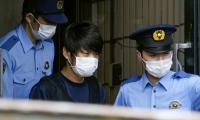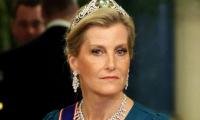Why ignore sectarian terror?
Walking down the carefully preserved, unending maze of halls that form the bowels of the Vatican Museum, my attention is riveted to a tapestry depicting the Massacre of the Innocents. This biblical event, that is oft disputed for its historical accuracy – contemporary scholarship frowns on there being any documented
By Khayyam Mushir
February 17, 2015
Walking down the carefully preserved, unending maze of halls that form the bowels of the Vatican Museum, my attention is riveted to a tapestry depicting the Massacre of the Innocents.
This biblical event, that is oft disputed for its historical accuracy – contemporary scholarship frowns on there being any documented evidence to confirm this alleged spree of infanticide by Herod on the announcement of the birth of Jesus – nevertheless finds a strange and horrifying parallel in the Peshawar attack of December 16.
I’m moved, unnerved and ultimately doubly aggrieved as I view this splendid reincarnation of terror exacted on the innocent: by the desperation painted into the eyes of the petrified mothers who desperately cling on to their children; by the grinning masks of lunacy that form the faces of the advancing sword wielding Roman soldiers as they grab at the naked limbs of wailing terrified infants; at the mixture of grief juxtaposed with a desperate plea for divine help, in the face of the mother who kneels numbed with shock in the bottom part of the tapestry, cradling her dead infant who has been stabbed in the side and bleeds his way to an untimely, brutal and premature end.
Peshawar was not brutalised for the first or the last time on December 16. The city, at the forefront of the civil-military offensive against terror, has burned for nearly a decade now, as the establishment struggles to secure it from the whiplash of terrorists pursued and hunted in its environs, extending to the border with Afghanistan. Friends and acquaintances recount tales of how the lives of its simple and peace-loving inhabitants is fractured and devastated by continuing incidents of terror. Its hospitals and pharmacies are full of patients suffering from trauma, psychological stress disorders, insomnia, and hypertension. There is no concept of post-traumatic stress counselling and anecdotal evidence suggests that it is not just the victims of terror that are in need of such services, but also the caregivers, the nursing staff and the doctors of hospitals who remain neglected and equally traumatised and who queue up in pharmacies to purchase over-the-counter anti-depressants and sleep medication.
Barely two months on and another imambargah in the city has burned and unwillingly offered up the lives of its innocent worshippers to satiate the blood lust of terrorists. Terrorists who murder without impunity – on the conviction that sectarian difference is sufficient licence to kill. Even as the war against terror rages on in the north-western fringes of our country, even as newspapers are full of encouraging stories of carefully planned, precise attacks on militant strongholds, of cooperation with Afghanistan, of fluid intelligence sharing between civil and military agencies, the sectarian aspect of terror is by and large overlooked.
What continues unabated in the context of the Shia populace of Pakistan is a coordinated genocide, which if it continues unchecked will only end with the mass emigration of this minority from Pakistan, an event that will signal the end of any chances of internal peace, stability, reconciliation, tolerance or progress.
Which brings us to the question of why this is an aspect of civil disorder and the circumvention of the stated law of the land that remains ignored. Time and again, the perpetrators of violence against Shias are the usual suspects: the well-known militant terrorist Sunni outfits that unabashedly and gleefully admit responsibility for all such acts of terror. Time and again we bear witness to the ineffectual hollow statements of apology and condemnation that are issued from official quarters and which amount to nothing more than posturing, mute reminders of the state’s unwillingness and its inability to protect the minority Shia. An inability that is lent ominous overtones when one considers that every single member of these self-confessed purveyors of terror, particularly their senior command, is a known offender with a documented criminal record and therefore capable of easy apprehension.
These banned groups kill out of a naked and inexplicable hatred for the Shia sect. Yet there is another nameless outfit of terrorists that is not interested in the mass murder of this minority, but chooses to engage in the targeted killings of its intellectuals, its scientists, its thinkers. Easily hundreds of Shia doctors and teachers have been laid to rest across Pakistan and this particular brand of killing continues steadily in the backdrop of more eye-catching acts of terror like the Hayatabad imambargah massacre.
Much as Herod may have imagined that his throne would be secured from challenge in the divine form of Jesus, should he murder every infant birthed in Bethlehem, so the targeting of Shia intellectuals aims at robbing this minority of its lifeblood of intellectual dissent, to thus effectively and completely demoralise it from organising any effective rebuttal or protest.
In the past 40 years since Ziaul Haq’s Islamisation drive, during which were sown the seeds of sectarian hatred, the Shia-Sunni strife has seen the brutal and unnecessary murder of many innocents on both sides of this sectarian divide. The only beacon of hope remains with the masses of Pakistan, who despite this unending feud remain connected socially, culturally and emotionally; by doing so they choose to ignore what is essentially a difference of historical political origin and thus prevent it from turning into a communal carnage, as was seen at the time of partition. This defeats the real designs of the extremists, who have been trying to ignite a mass conflagration, by attacking imambargahs and Sunni masajid.
Despite it all Sunni and Shia citizens continue to live peacefully as good neighbours, which one can imagine must be very frustrating for these hate-mongers. Still more surprising is the fact that over the years our political leadership and those at the helm of affairs have made no effort to exploit this positive societal phenomenon, to weaken the terrorist outfits and strengthen sectarian harmony.
The writer is a freelance columnist.
Email: kmushir@hotmail.com
Twitter: @kmushir
This biblical event, that is oft disputed for its historical accuracy – contemporary scholarship frowns on there being any documented evidence to confirm this alleged spree of infanticide by Herod on the announcement of the birth of Jesus – nevertheless finds a strange and horrifying parallel in the Peshawar attack of December 16.
I’m moved, unnerved and ultimately doubly aggrieved as I view this splendid reincarnation of terror exacted on the innocent: by the desperation painted into the eyes of the petrified mothers who desperately cling on to their children; by the grinning masks of lunacy that form the faces of the advancing sword wielding Roman soldiers as they grab at the naked limbs of wailing terrified infants; at the mixture of grief juxtaposed with a desperate plea for divine help, in the face of the mother who kneels numbed with shock in the bottom part of the tapestry, cradling her dead infant who has been stabbed in the side and bleeds his way to an untimely, brutal and premature end.
Peshawar was not brutalised for the first or the last time on December 16. The city, at the forefront of the civil-military offensive against terror, has burned for nearly a decade now, as the establishment struggles to secure it from the whiplash of terrorists pursued and hunted in its environs, extending to the border with Afghanistan. Friends and acquaintances recount tales of how the lives of its simple and peace-loving inhabitants is fractured and devastated by continuing incidents of terror. Its hospitals and pharmacies are full of patients suffering from trauma, psychological stress disorders, insomnia, and hypertension. There is no concept of post-traumatic stress counselling and anecdotal evidence suggests that it is not just the victims of terror that are in need of such services, but also the caregivers, the nursing staff and the doctors of hospitals who remain neglected and equally traumatised and who queue up in pharmacies to purchase over-the-counter anti-depressants and sleep medication.
Barely two months on and another imambargah in the city has burned and unwillingly offered up the lives of its innocent worshippers to satiate the blood lust of terrorists. Terrorists who murder without impunity – on the conviction that sectarian difference is sufficient licence to kill. Even as the war against terror rages on in the north-western fringes of our country, even as newspapers are full of encouraging stories of carefully planned, precise attacks on militant strongholds, of cooperation with Afghanistan, of fluid intelligence sharing between civil and military agencies, the sectarian aspect of terror is by and large overlooked.
What continues unabated in the context of the Shia populace of Pakistan is a coordinated genocide, which if it continues unchecked will only end with the mass emigration of this minority from Pakistan, an event that will signal the end of any chances of internal peace, stability, reconciliation, tolerance or progress.
Which brings us to the question of why this is an aspect of civil disorder and the circumvention of the stated law of the land that remains ignored. Time and again, the perpetrators of violence against Shias are the usual suspects: the well-known militant terrorist Sunni outfits that unabashedly and gleefully admit responsibility for all such acts of terror. Time and again we bear witness to the ineffectual hollow statements of apology and condemnation that are issued from official quarters and which amount to nothing more than posturing, mute reminders of the state’s unwillingness and its inability to protect the minority Shia. An inability that is lent ominous overtones when one considers that every single member of these self-confessed purveyors of terror, particularly their senior command, is a known offender with a documented criminal record and therefore capable of easy apprehension.
These banned groups kill out of a naked and inexplicable hatred for the Shia sect. Yet there is another nameless outfit of terrorists that is not interested in the mass murder of this minority, but chooses to engage in the targeted killings of its intellectuals, its scientists, its thinkers. Easily hundreds of Shia doctors and teachers have been laid to rest across Pakistan and this particular brand of killing continues steadily in the backdrop of more eye-catching acts of terror like the Hayatabad imambargah massacre.
Much as Herod may have imagined that his throne would be secured from challenge in the divine form of Jesus, should he murder every infant birthed in Bethlehem, so the targeting of Shia intellectuals aims at robbing this minority of its lifeblood of intellectual dissent, to thus effectively and completely demoralise it from organising any effective rebuttal or protest.
In the past 40 years since Ziaul Haq’s Islamisation drive, during which were sown the seeds of sectarian hatred, the Shia-Sunni strife has seen the brutal and unnecessary murder of many innocents on both sides of this sectarian divide. The only beacon of hope remains with the masses of Pakistan, who despite this unending feud remain connected socially, culturally and emotionally; by doing so they choose to ignore what is essentially a difference of historical political origin and thus prevent it from turning into a communal carnage, as was seen at the time of partition. This defeats the real designs of the extremists, who have been trying to ignite a mass conflagration, by attacking imambargahs and Sunni masajid.
Despite it all Sunni and Shia citizens continue to live peacefully as good neighbours, which one can imagine must be very frustrating for these hate-mongers. Still more surprising is the fact that over the years our political leadership and those at the helm of affairs have made no effort to exploit this positive societal phenomenon, to weaken the terrorist outfits and strengthen sectarian harmony.
The writer is a freelance columnist.
Email: kmushir@hotmail.com
Twitter: @kmushir
-
 Harry Styles Excites Fans As He Announces Release Date Of New Song
Harry Styles Excites Fans As He Announces Release Date Of New Song -
 Japan’s Ex-PM Shinzo Abe’s Killer Is Set To Be Sentenced: How Much Punishment Could He Face?
Japan’s Ex-PM Shinzo Abe’s Killer Is Set To Be Sentenced: How Much Punishment Could He Face? -
 Prince Harry, Meghan Markle’s Return To UK Could Create Royal Family Dilemma
Prince Harry, Meghan Markle’s Return To UK Could Create Royal Family Dilemma -
 Prince Harry Turns Troubled With No Sense Of Home: ‘Isolation Is Getting To Him Mentally’
Prince Harry Turns Troubled With No Sense Of Home: ‘Isolation Is Getting To Him Mentally’ -
 Vitamin D Link To Respiratory Diseases Will Shock You
Vitamin D Link To Respiratory Diseases Will Shock You -
 A$AP Rocky Gives His Take On Children's Budding Personalities
A$AP Rocky Gives His Take On Children's Budding Personalities -
 Elijah Wood On Return To 'Lord Of The Rings' Universe
Elijah Wood On Return To 'Lord Of The Rings' Universe -
 Princess Beatrice, Eugenie Resort To Begging Sarah Ferguson: 'It'll Bring Disaster For The Whole Family'
Princess Beatrice, Eugenie Resort To Begging Sarah Ferguson: 'It'll Bring Disaster For The Whole Family' -
 Jenny Slate Hails Blake Lively Amid Lawsuit Against Justin Baldoni
Jenny Slate Hails Blake Lively Amid Lawsuit Against Justin Baldoni -
 Sophie Wessex Shares 'frustration' From Early Days In Royal Family
Sophie Wessex Shares 'frustration' From Early Days In Royal Family -
 Jason Momoa's Aquaman Unseen Snap Revealed
Jason Momoa's Aquaman Unseen Snap Revealed -
 Prince Harry Taught Only Way King Charles 'will Take Him Seriously'
Prince Harry Taught Only Way King Charles 'will Take Him Seriously' -
 Meghan Markle’s Reaction To UK Talks With Prince Harry Comes To The Forefront: ‘Leaving Me?’
Meghan Markle’s Reaction To UK Talks With Prince Harry Comes To The Forefront: ‘Leaving Me?’ -
 Taylor Swift Slams Justin Baldoni In Explosive Text Messages, Court Filing Reveals
Taylor Swift Slams Justin Baldoni In Explosive Text Messages, Court Filing Reveals -
 Blake Lively’s Drops New Allegations Against Justin Boldoni About Birth Scene
Blake Lively’s Drops New Allegations Against Justin Boldoni About Birth Scene -
 Andrew's Reasons For Giving Sarah Ferguson A Rent-free Home For 30 Years After Divorce Finally Finds An Answer
Andrew's Reasons For Giving Sarah Ferguson A Rent-free Home For 30 Years After Divorce Finally Finds An Answer



